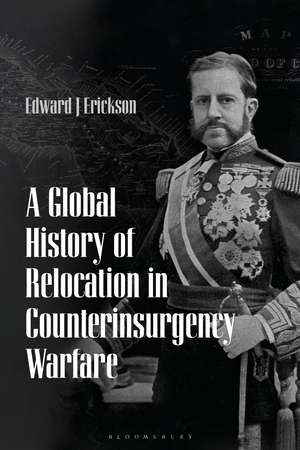A Global History of Relocation in Counterinsurgency Warfare
Editat de Edward J. Ericksonen Limba Engleză Paperback – 11 dec 2019
Toate formatele și edițiile
| Toate formatele și edițiile | Preț | Express |
|---|---|---|
| Paperback (1) | 193.62 lei 3-5 săpt. | |
| Bloomsbury Publishing – 11 dec 2019 | 193.62 lei 3-5 săpt. | |
| Hardback (1) | 570.51 lei 6-8 săpt. | |
| Bloomsbury Publishing – 11 dec 2019 | 570.51 lei 6-8 săpt. |
Preț: 193.62 lei
Preț vechi: 223.97 lei
-14% Nou
Puncte Express: 290
Preț estimativ în valută:
37.05€ • 40.41$ • 31.24£
37.05€ • 40.41$ • 31.24£
Carte disponibilă
Livrare economică 04-18 aprilie
Preluare comenzi: 021 569.72.76
Specificații
ISBN-13: 9781350062597
ISBN-10: 1350062596
Pagini: 304
Ilustrații: 5 bw illus
Dimensiuni: 156 x 234 x 14 mm
Greutate: 0.45 kg
Editura: Bloomsbury Publishing
Colecția Bloomsbury Academic
Locul publicării:London, United Kingdom
ISBN-10: 1350062596
Pagini: 304
Ilustrații: 5 bw illus
Dimensiuni: 156 x 234 x 14 mm
Greutate: 0.45 kg
Editura: Bloomsbury Publishing
Colecția Bloomsbury Academic
Locul publicării:London, United Kingdom
Caracteristici
Approaches relocation from the standpoints of military history, political history, counterinsurgency studies and genocide studies
Notă biografică
Edward J Erickson is Professor of Military History at the Marine Corps University, USA. He is widely recognized as one of the foremost specialists on the Ottoman Army during the First World War. His most recent publications include Gallipoli: Command under Fire (Osprey Publishing, 2015), Ottomans and Armenians: A Study in Counterinsurgency (2013) and Ottoman Army Effectiveness in World War I (2007).
Cuprins
List of MapsIntroduction, Dr. Edward J Erickson 1. Exile without End, The Acadian Expulsion, Major Christine Keating2. The Long Walk of the Najavo, Relocation in the American Southwest, Dr. Jonathan F Phillips3. War Answered with War, The Spanish in Cuba, Major Mark Askew4. A Howling Wilderness, America in the Philippines, Dr. Ethan H Harding5. Methods of Barbarism, The Boer War, Dr. John Sheehan6. Uneven Repression, The Ottoman State and its Armenians, Dr. Maxime Gauin7. From the Pale, The Russians and the Jews, LtCol Kevin D Glathar8. They are our Enemies, The Japanese-American Internment, Dr. Edward J Erickson9. A Collective Measure, Population Resettlement in the Malayan Emergency, LTC Gregory J Reck10. Regroupment Centres, The French in Algeria, Dr. James Tallon11. Counterinsurgency at the 'Rice Roots' Level, South Vietnam's Strategic Hamlet Campaign, Dr. Nathan R Packard12. Resettlement in the Portuguese Colonial Wars, Africa, 1961-1975, Dr. Kalev I SeppConclusions: Relocation in Counterinsurgency Warfare, Dr. Edward J EricksonAppendicesIndex
Recenzii
Recommended. General readers through faculty; professionals.
It is certainly groundbreaking, and deserves a place on the bookshelf of any reader interested in irregular warfare.
This book assembles a very useful selection of introductions to counterinsurgency relocation, including some (notably ... those in Cuba, South Africa, and Vietnam) which are excellent stand-alone summaries.
This is a fascinating, ground-breaking book that shows how so many counter-insurgency campaigns have used relocation and 'concentration' as an operational method against subject populations in revolt and during conflict, often on misplaced intelligence assessments.
It is certainly groundbreaking, and deserves a place on the bookshelf of any reader interested in irregular warfare.
This book assembles a very useful selection of introductions to counterinsurgency relocation, including some (notably ... those in Cuba, South Africa, and Vietnam) which are excellent stand-alone summaries.
This is a fascinating, ground-breaking book that shows how so many counter-insurgency campaigns have used relocation and 'concentration' as an operational method against subject populations in revolt and during conflict, often on misplaced intelligence assessments.
